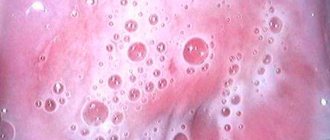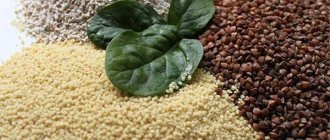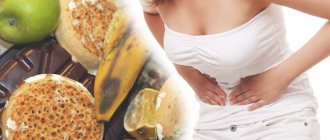Symptoms of diarrhea
Milk often causes loose stools, and it develops in both adults and children.
Milk diarrhea occurs due to a number of reasons, and by identifying them you can prevent unpleasant, uncomfortable diarrhea. According to medical terminology, diarrhea is a frequent bowel movement with changes in stool.
Diarrhea, caused by internal or external factors, can be of various types:
- Fermentative;
- Infectious;
- Dyspeptic;
- Nutritional.
Each type has its own causes, differs in different symptoms and treatment methods:
- Fermentative diarrhea from milk appears due to excessive consumption of milk sugar, which enters the human intestinal tract with milk. Symptoms of this disease disappear after giving up dairy products.
- Infectious diarrhea is always associated with the appearance of E. coli, salmonella and many others in the human body. The causes of this disease are the use of low-quality, expired products.
- Dyspeptic diarrhea from milk occurs due to an insufficient amount of enzymes that help digest and absorb lactose, which is part of dairy products.
- The nutritional type of diarrhea from milk occurs due to an incorrectly composed human diet. And this disease also manifests itself in allergies to dairy products. Alimentary diarrhea is accompanied by high fever, redness of the skin, discharge from the nose and mucous membranes of the eyes. If you are allergic to dairy products, it is strictly forbidden to consume any of them: yogurt, milk, kefir, cottage cheese. Otherwise, it will lead to an acute form of diarrhea.
Symptoms
Diarrhea after milk and its symptoms are difficult to miss. 30 minutes after consuming a low-quality product or milk that the body does not accept, the following begins:
- Cramps in the lower abdomen;
- Bloating;
- Watery, persistent diarrhea;
- Gas formation.
Causes
Diarrhea from dairy products is quite common; the reasons for its occurrence can be completely different.
Individual lactose intolerance or, as it is also called lactose deficiency, characterizes a feature of the digestive system in which the body cannot absorb milk sugar, lactose.
When milk sugar enters the digestive tract, the body tries to remove it by all means. And the most accessible method is diarrhea or bowel movement. In 90% of cases, lactose deficiency is a genetically transmitted disease.
If the disease is not stopped in time, it becomes chronic, which leads to intestinal dysbiosis.
Allergy
Diarrhea from cottage cheese, milk or cheese may be a consequence of the development of an allergic reaction of the body. An allergy to dairy products can easily be confused with lactose intolerance, but it occurs with more pronounced symptoms: rash, vomiting, swelling of the mucous membranes of the eyes.
Diarrhea may develop as a result of other serious illnesses such as pancreatitis. With this disease, you just have to drink a glass of milk or yogurt, eat cottage cheese, and bloating, diarrhea, and pain begin. And also such symptoms can characterize inflammation of the small intestine.
There is a direct relationship between a person’s age and the ability of the body’s enzymes to digest dairy products. The older you get, the higher the risk that an adult will develop diarrhea due to low digestibility of milk and lactose.
Diagnostics
- When diarrhea appears after milk, it is important to promptly diagnose and determine the causes in order to correctly select the method of further treatment.
- Diarrhea can be the main or additional symptom; to identify pathologies or disruption of the enzyme system, it is worth contacting an experienced, qualified doctor.
- Having contacted, in the first days of the appearance of diarrhea, the doctor can make a diagnosis after examination, based on the clinical picture: bloating, diarrhea, body temperature.
To clarify the possible causes and make the correct diagnosis, a test is performed.
In the morning, before meals, consume 50 g of lactose. If you are lactose intolerant, you will experience the standard symptoms. This is the simplest and fastest method to determine the exact cause of diarrhea from milk.
Treatment
Qualified medical care for diarrhea from dairy products directly depends on the identified causes, which make it possible to prescribe an effective treatment regimen.
Diarrhea may be a secondary symptom when a primary disease develops. To eliminate the symptom, it is necessary to direct all efforts to treat the root cause of diarrhea. However, you should choose drugs that do not contain lactose. It is imperative to exclude all dairy products and adhere to a strict diet.
Milk is a liquid produced by the mammary glands of mammals. Its main purpose is to feed the offspring. The secreted secretion contains nutrients necessary to strengthen the immune system, growth and development of the baby.
Due to the beneficial properties of the drink, milk is used as an independent food product and for preparing culinary delicacies. It is believed to be equally beneficial for both children and adults. However, in some cases, the digestive system reacts to a healthy drink with diarrhea.
We suggest you figure out why diarrhea from milk happens and how to avoid the appearance of an unpleasant symptom.
The composition of milk includes about three hundred components. The main component is water, in which other organic and inorganic components are dissolved. From the point of view of physical chemistry, the drink is a stable colloidal solution. The main substances included in the drink:
- lactose – participates in the synthesis of vitamins and fats, activates the cardiovascular system;
- proteins (casein, albumin, globulin) – the main “building material” that ensures muscle growth;
- enzymes – help release valuable vitamins and minerals from food;
- beneficial nutrients (potassium, calcium, phosphorus) – stimulate the immune system, strengthen bone tissue;
- microelements (iodine, selenium, chromium) – ensure the normal course of physiological processes;
- lecithin – increases immunity, activates brain function;
- cholesterol - participates in the processes of hematopoiesis and the synthesis of vitamin D;
- ergosterol – converted to calciferol (vitamin D) under the influence of ultraviolet radiation;
- retinol and tocopherol (vitamins A and E) – have a pronounced antioxidant effect, strengthen the walls of blood vessels, and have a general rejuvenating effect;
- B vitamins are substances necessary for the normal functioning of the human nervous system;
- citric acid - helps to evacuate heavy metal salts from the body.
Milk contains hormones necessary for normal life, including thyroxine, which regulates lipid metabolism.
Milk is intended for feeding a newborn and, it would seem, it contains everything so that the product is well absorbed by the body. Meanwhile, dyspepsia or “indigestion” after taking it is not so rare. “Milk” diarrhea manifests itself almost immediately after consuming the product. In addition to watery stools, symptoms such as:
- intestinal colic;
- bloating;
- flatulence;
- heaviness in the epigastric region.
Bowel movements occur quite often, and stool may contain particles of mucus.
To avoid such an unpleasant symptom as sudden diarrhea, it is necessary to understand the reasons for its appearance after drinking milk.
Medical practice shows that individual intolerance to the main component of the drink, lactose, occurs in 2% of patients.
In the vast majority of cases, this is a congenital disease in which the body simply does not digest the product. The pathology is caused by a reduced level of lactase, an enzyme necessary for the absorption of lactose.
Among the reasons why diarrhea occurs from dairy products in children and adults are diseases of the gastrointestinal tract, such as:
- inflammation of the small intestine;
- gastritis;
- dysbacteriosis;
- acute or chronic pancreatitis.
With dysbacteriosis, only whole milk is poorly absorbed, while low-fat and fermented milk products are accepted normally by the body. Diarrhea from milk is often observed after intervention on the intestines or stomach. This is a temporary phenomenon that occurs during the postoperative recovery period.
For some people, dairy products are allergens. The antigens here are the serum proteins alpha and beta-lactoalbumin, as well as albumin.
An allergy to dairy products is accompanied not only by diarrhea, but also by skin rashes, swelling of the mucous membranes, and severe itching.
If diarrhea does not go away for several days after milk, this is a reason to suspect the presence of an infection. E. coli or salmonella is found in foods that have not been heat-treated or have been stored for too long. Treatment of diarrhea of an infectious nature requires mandatory consultation with a specialist, and sometimes hospitalization of the patient.
Often the answer to the question why diarrhea after milk began for no apparent reason is the increased fat content of the product. A resident of a metropolis who is not accustomed to fresh drinks will certainly suffer from diarrhea and bloating after tasting the village treat. In addition, milk does not go well with some foods and their combined use can cause dyspepsia.
To find out why milk causes diarrhea, some research needs to be done. The presence of an allergy can be determined by a breath test, which measures the level of hydrogen in the exhaled air after taking lactose. In order to exclude infectious contamination, the patient donates blood and stool for laboratory analysis.
If diarrhea is not infectious in nature, it can be dealt with using the same methods as with a common digestive disorder. The following remedies will help stop milk diarrhea in adults and adolescents:
- Smecta is a natural adsorbent that helps eliminate toxins and eliminate increased gas formation.
- Phosphalugel is a drug of combined action that envelops the mucous membrane, preventing its irritation, and eliminates toxic decomposition products.
- Loperamide is an inexpensive drug that regulates peristalsis and reduces the flow of fluid into the intestinal lumen.
- Linex forte - restores the microflora of the intestinal tract, eliminates bloating.
Cottage cheese for diarrhea, is it possible to eat cottage cheese for diarrhea?
Cottage cheese is made by fermenting milk and expressing the resulting whey. It is rich in vitamins, minerals and contains very few carbohydrates. Depending on the amount of fat, cottage cheese can be low-fat, semi-fat or full-fat. Cottage cheese is considered the most valuable product used in the prevention and treatment of diarrhea. This product cleanses and strengthens the body, suppresses the development of harmful bacteria in the intestines. Its fastening properties are several times stronger than those of kefir. It can be eaten by people of any age.
It is recommended to eat cottage cheese if there is a lack of calcium, metabolic disorders, hypertension and anemia, obesity, and nervous disorders. An important contraindication is liver disease. During intestinal disorders manifested through diarrhea, you should limit the consumption of cottage cheese to 200 grams per day, dividing this amount into several doses.
To summarize, we note that fermented milk products such as kefir, sour cream, yogurt, cottage cheese and cheese can be used in dietary nutrition for diarrhea. Each of them is unique and in its own way supports the functioning of the digestive system at the proper level. The use of such products is allowed for mild diarrhea in small quantities. Abuse leads to increased painful symptoms. It is not recommended to take fermented milk products if you have an individual intolerance, which can cause additional discomfort.
Milk often causes loose stools, and it develops in both adults and children. Milk diarrhea occurs due to a number of reasons, and by identifying them you can prevent unpleasant, uncomfortable diarrhea.
How is the diagnosis carried out?
Identifying milk allergies
First you need to understand the causes of diarrhea. The patient must undergo a milk sugar tolerance test. The study is carried out orally.
You can find out if you are lactose intolerant by taking a breath test. During the examination, the level of hydrogen in the exhaled air is measured.
The human body reacts differently to dairy products. To identify lactose intolerance in chronic constipation, the patient undergoes a special test.
The procedure involves a person taking 50 grams of lactose in the morning on an empty stomach. If there is a deficiency of enzymes, the patient experiences symptoms of diarrhea. Determining the right product can only be done through trial and error.
In order not to harm your health, you need to consider the following points:
- Introducing several dairy products into the diet at once increases the risk of diarrhea;
- Milk should not be drunk in large quantities. This only provokes the development of diarrhea. Enzymes are needed to digest milk sugar.
- Enzyme deficiency leads to diarrhea. However, milk has great value for humans. The calcium it contains is involved in the process of bone tissue formation. In addition, milk contains vitamins necessary to maintain vitality.
How the problem will manifest itself: presence of diarrhea and discomfort
Lactase deficiency manifests itself quite typically: when drinking a sufficiently significant volume of milk, diarrhea develops without fever or signs of infection. But when consuming dairy products (kefir, yogurt, dishes with processed milk) there are no problems, no diarrhea occurs. How to explain the occurrence of diarrhea, why whole milk?
It's simple: lactose, or milk sugar, getting in with milk (and usually its volume is more than 50-200 ml) cannot be broken down and absorbed in the small intestine due to a deficiency of enzymes. Then milk sugar, undigested, enters the large intestine, where the microbes that live there readily feast on it. They ferment lactose into water and carbon dioxide, as well as intermediate metabolic products (in particular, lactic acid). Excess water, gases and metabolic products irritate the intestinal walls, liquefy food masses - hence diarrhea, bloating, and abdominal pain.
What diseases may this indicate?
Diarrhea is an acute condition that accompanies the underlying disease.
- if diarrhea after milk occurs regularly, the reason is individual lactose intolerance;
- diarrhea due to milk drunk in large quantities indicates enzyme deficiency;
- if, in addition to diarrhea, a rash bothers you, these are allergic reactions;
- stool disorders indicate recent surgical interventions, internal diseases - pancreatitis, short bowel syndrome, oncological tumors.
Diet for intolerance
If a person is intolerant to dairy products, then it is impossible to completely exclude them from the diet, because they contain calcium. Therefore, doctors give the following recommendations on how else you can reduce the risk of diarrhea after eating milk and dairy products:
- It is better to combine milk with other foods or cereals. This will ensure better absorption and easier digestion, therefore there is less risk of unpleasant consequences.
- It is better to consume milk and dairy products in small portions, divided into several doses. For example, if you drink ½ cup of milk 2-3 times a day with food, it will be safe for the body.
This diet will provide the necessary calcium content. In addition, you need to include other calcium-rich foods in your diet, such as almonds, green vegetables, broccoli, spinach, fish, soy milk, etc.
Is it possible to consume low-fat dairy products if you have diarrhea?
| Group of drugs | pharmachologic effect | Representative drugs |
| Electrolytes | Normalization of water-salt balance | Regidron, Hydrovit |
| Probiotics | Restoration of gastrointestinal microflora | Linex, Hilak |
| Sorbents | Binding and removal of toxins | Activated carbon, Polysorb |
| Antidiarrheals | Stops acute diarrhea. Take it if an adult’s diarrhea does not stop for a long time after drinking milk | Loperamide |
| Enzyme-containing drugs | Accelerates digestion of food bolus | Pepsin, Mezim, Laktazar (for children) |
| Nonsteroidal anti-inflammatory drugs | Analgesic, antipyretic, anti-inflammatory effect | Aspirin, Ibuprofen |
Medicines are taken as prescribed by a doctor.
The effect of lactose on the body
Many people think that skim milk contains less lactose. However, in reality this is not the case. The risk of diarrhea after consuming low-calorie dairy products is quite high.
Diarrhea after milk cannot be prevented by reducing the fat content of the product. It is necessary to reduce the amount of lactose, which is the cause of digestive upset.
Some people produce so little of the enzyme that even a small amount of milk can cause diarrhea. Despite the high level of lactose, yogurt is better absorbed in the human body. Much depends on the type of this product.
Pasteurized yogurt cannot be called healthy, since it does not retain the bacteria necessary for the body. Patients with this pathology will appreciate chocolate milk. It has a pleasant taste. This product contains calcium necessary for the body.
Cocoa stimulates the production of enzymes necessary to digest lactose.
The list of healthy foods includes some types of cheese. Cheddar and mozzarella contain a lot of calcium, which is easily absorbed in the intestines.
The advantage of such products is their low lactose content. This allows the cheese to be used even in severe forms of the disease. Unlike cheese, cottage cheese often leads to diarrhea.
Features of the disease
The appearance of diarrhea in the adult population may be associated with pathologies of the gastrointestinal tract due to alcohol abuse, inclusion in the diet of fatty, spicy foods, processed foods, and fast food. In case of digestive disorders, exceeding the prescribed daily intake of dairy products leads to the body not absorbing the sugar contained in yoghurt, kefir, sour cream and other ingredients. With lactase deficiency, age-related changes are noticeable: the older the person, the higher the likelihood of the disease developing into a chronic form - destruction of the intestinal microflora.
In a child, diarrhea is characterized by the release of green stool with a sour odor. If the baby is breastfed, then diarrhea can occur from improper feeding - sucking only “foremilk”, which does not contain the fats necessary for normal digestion.
Diarrhea from milk in adults: causes, treatment
The result of treatment depends on the correctness of the diagnosis.
Diagnostics include:
- Take 50 grams of lactose on an empty stomach in the morning. Diarrhea caused by taking milk sugar means that the patient has an individual intolerance.
- Breath test (measures exhaled hydrogen levels).
- Ultrasound of internal organs.
- General tests of stool and urine.
Therapy depends on the type of diarrhea and the cause that caused it. For diarrhea, therapeutic fasting with plenty of fluids for 12 hours is recommended. After the diarrhea has stopped, food is introduced gradually. Water porridge and rice water are recommended.
| Diseases, conditions | Treatment |
| Individual lactose intolerance | Eliminate milk, sour cream, cottage cheese, and butter from the diet. In case of individual lactose intolerance in infants, replace the formula with a lactose-free one. |
| Lactose deficiency | Enzyme-containing drugs. |
| Diseases of the gastrointestinal tract | Treatment of the underlying disease. Treatment is carried out by prescribing drugs that do not contain lactose. |
| Allergic reactions | Limit consumption of dairy foods. |
| Age factor | Older people should reduce the amount of milk they consume. Taking medications as prescribed by the doctor to increase enzyme levels. |
| Surgical interventions | Follow the diet prescribed by your doctor. |
Lactase deficiency is more common among representatives of the Asian race.
You cannot completely give up milk. In order to avoid relapses in the future, in case of lactose intolerance and allergic reactions, new products should be introduced into the diet gradually.
- start with one dairy product per day in small quantities. Gradually increase the dosage;
- replace milk-containing ones with analogues that do not contain lactose;
- milk is better absorbed if you eat dishes with cereals, bread, and bran;
- eliminating milk from the diet causes calcium deficiency. Consume other sources of macronutrients: spinach, broccoli, natural soy milk;
- Without restrictions, you can eat porridge cooked in water, low-fat broths, fruit and vegetable purees, baked apples, crackers.
Note for patients with diarrhea due to dairy products:
- Yogurt contains lactose, however, in most cases this product does not cause diarrhea.
- When buying cheese, choose Parmesan and mozzarella; they contain minimal amounts of lactose.
- Chocolate milk is a healthy product containing calcium. The composition includes cocoa, which stimulates lactose.
- It is a mistake to believe that the lower the percentage of fat in a fermented milk product, the less lactose there is.
- Do not drink milk before meals, as the effect of gastric juice is weakened.
- Drink fluids at a comfortable temperature. Too cold milk causes spasms of the gastrointestinal tract, while a hot product irritates the mucous membranes.
- Do not combine with baked goods and boiled potatoes.
- If you cannot completely give up the substance, drink goat's milk. It contains less lactose than cow's milk. The milk of domestic cows contains a higher percentage of fat content.
- Do not combine with coffee, kvass, or alcohol.
The condition requires urgent medical attention if there is an increase in body temperature, a rash of unknown etiology, if the patient has severe diarrhea for more than 3 days, or if there is blood in the stool.
Loading …
Diagnosis
Although the reasons why an adult develops diarrhea after drinking milk are very varied, it is important to immediately rule out true or temporary lactose intolerance.
Diagnosis is carried out as follows:
- Lactose tolerance test . It is done first. The patient drinks 50 ml of milk on an empty stomach. If corresponding symptoms (bloating, urge to defecate) occur within half an hour, lactase deficiency is suspected.
- Breath test . Determines allergies to dairy products. It is determined by the amount of hydrogen that the patient exhales.
- Stool culture for dysbacteriosis. Helps determine the ratio of beneficial and pathogenic flora in the intestines.
- General blood test, stool for coprogram. These studies are carried out to establish other possible ailments (inflammation, infectious diseases), if lactose intolerance or dysbiosis are excluded
- Instrumental procedures : ultrasound, x-ray. They are prescribed to assess the condition of the gastrointestinal tract.
Diarrhea from milk in adults: causes, treatment
Despite the fact that a person may have milk intolerance, this product cannot be completely excluded from the diet, since it contains calcium. It is possible to reduce the risk of diarrhea.
To avoid digestive upset, it is better not to drink milk in its pure form. It can be mixed with other products. Cereals go well with milk.
This will make it easier to digest dairy products and reduce the risk of developing diarrhea.
Some people's bodies are unable to digest lactose. To help such patients, special medications containing enzymes are prescribed. You can cope with diarrhea through a therapeutic diet.
When a patient has diarrhea, it is necessary to understand the causes of the disease. During the diagnostic process, the doctor determines the factors that provoke the development of diarrhea. If diarrhea is a consequence of an enzyme deficiency, then it is best to avoid dairy products.
Although it will be quite difficult to completely eliminate these foods, since the body needs calcium. You can use kefir instead of whole milk. Cheese contains a small amount of lactose. At the same time, this product saturates the body with calcium.
Treatment
Qualified medical care for diarrhea from dairy products directly depends on the identified causes, which make it possible to prescribe an effective treatment regimen.
Diseases of internal organs
Diarrhea may be a secondary symptom when a primary disease develops. To eliminate the symptom, it is necessary to direct all efforts to treat the root cause of diarrhea. However, you should choose drugs that do not contain lactose. It is imperative to exclude all dairy products and adhere to a strict diet.
Lactose intolerance
For this reason, it is important to exclude dairy products completely from the diet. It is imperative to reduce the level of consumption of not only milk, because diarrhea can occur from yogurt, cheese, and cottage cheese. It is important to strictly monitor the body’s reaction. To improve your health, your doctor will prescribe special tablets and drops that increase the level of enzymes in the body.
Allergy
An allergic reaction to the consumption of dairy products, manifested in the form of diarrhea, is a disease in which it is important to completely exclude milk and related dairy products from the diet.
Possible complications and prevention
Without treatment, complications are possible:
- diarrhea from milk leads to the leaching of beneficial microflora of the gastrointestinal tract and dysbacteriosis;
- violation of water-salt balance, dehydration;
- transition of diarrhea to the chronic stage;
- hypovolemic and septic shock;
- acute renal failure.
To prevent diarrhea:
- Check expiration dates before use.
- The dishes must be clean.
- Use with caution if you have enzyme deficiency. If you are lactose intolerant, avoid milk-containing products.
- Milk should be boiled before drinking. Sour cream, kefir and yoghurt products are consumed ready-made.
- Consult your doctor and nutritionist about the amount of the substance allowed per day.
- Immediately after surgery, refrain from drinking milk for at least a month.
Diarrhea from cottage cheese can occur in adults and children. Simultaneously with drug treatment, the patient's diet is adjusted to exclude lactose-containing products. To prevent dehydration during diarrhea, it is recommended to drink as much liquid as possible: clean water, herbal decoctions, berry jelly.
The article has been approved
by the editors
Nutritional characteristics and genetics
The activity of this enzyme and its changes over time are programmed in the genes. If traditional nutrition in the centuries-old history of a nationality or race involves active consumption of milk, then the enzyme does not lose activity, a person can drink milk calmly all his life, he has inherited such characteristics from his parents. If the diet involves little or no milk consumption, with age the necessary enzymes are produced less and less and intolerance gradually develops. In such people, genes that code for the production of necessary enzymes are lost or inactive. For example, if this is Japan, then its traditional foods are rice, cereals, plant foods, seafood, fish, and raising cows and drinking milk is not common among them. Hence the peculiarity of the operation of the gene encoding the necessary enzyme, which has been formed over centuries. But in Holland and Denmark, where livestock farming is actively developed and many people consume milk, only 2% of the adult population cannot tolerate this product.
How to eliminate diarrhea in children
Diarrhea in children
Lactazar can be used to treat children. This drug contains an enzyme that is necessary for the digestion of dairy products. The product promotes the breakdown of milk sugar.
What to do if a digestive disorder has been identified in a baby? The pediatrician recommends that the mother purchase special formulas that do not contain lactose.
Diarrhea occurs due to the fact that the baby is fed the wrong formula. If intense diarrhea occurs, you should consult a specialist. A baby's diarrhea after drinking milk has a sour smell. The stool takes on a characteristic green color.
For diarrhea due to lactose deficiency, therapeutic fasting for 12 hours helps. To replenish lost fluid, you need to give your baby a rosehip decoction. The development of dehydration can be prevented by using rehydration medications (Regidron, Hydrolyte).
To strengthen the stool, prepare rice water for your child. It should be given 100 ml 3 times a day. If signs of diarrhea appear, breastfeeding should not be stopped. Most likely, the quality of the milk has nothing to do with it. The baby simply feeds on the milk in the front of the chest.
It has too many carbohydrates and not enough fat. The milk at the back of the breast is thicker. Diarrhea will stop if you give your baby the opportunity to suck the milk completely.
Allergy to cow's milk is detected in 2% of children. In this case, the baby develops vomiting, chronic diarrhea and abdominal cramps. Rashes can be seen on the skin of children.
Other reasons
Frustration after drinking milk can occur in a number of other cases:
- Dysbacteriosis. Diseases of the gastrointestinal tract often lead to one form or another of dysbiosis. As a result, the microflora in the intestines dies and milk ceases to be absorbed.
- Malfunctions of the gallbladder . Diarrhea from consuming dairy products appears against the background of any ailments associated with impaired secretory function of the gallbladder. If excess bile acids enter the intestines, the acidity of the environment changes and lactobacilli die.
- Inflammation of the intestinal and gastric mucosa . During inflammatory processes, the absorption mechanism is disrupted. Dairy products do not cause, but increase diarrhea.
- Allergy . Diarrhea from milk can be caused by an allergy. This diarrhea is accompanied by rashes and itching.
- Surgical interventions . After surgery, especially in the abdominal cavity, dairy products also cause diarrhea. Such patients are prescribed a special diet that excludes milk until intestinal functions are completely restored.
In an infant, diarrhea is often caused by drinking only milk from the front of the chest, which is rich in carbohydrates but low in fat. When the baby sucks completely, he also drinks milk from the back of the breast. At the same time, the diarrhea disappears.
What should I feed my baby if he has diarrhea after drinking milk?
The diet of a baby suffering from diarrhea should include porridge. It must be cooked without adding butter or milk. Include pureed soup with vegetables in your child's menu. During treatment, avoid foods that can cause allergies.
Strawberries, tangerines and oranges are prohibited.
Milk should be introduced into the baby’s diet gradually. To do this, add 1 drop of the product to a glass of water. After this, the solution is given to the baby to drink. Gradually, the concentration of milk in the solution must be increased. This will help your baby get used to dairy products.
It is necessary to relieve the digestive organs as much as possible. Fresh fruits are prohibited during diarrhea, as they are rich in plant fiber. Eating such foods will only worsen the symptoms of diarrhea.
Although the reasons for which diarrhea develops after milk may be different, all types of disorders are divided according to the type of reaction occurring inside. Diarrhea occurs:
- fermentation;
- infectious;
- dyspeptic;
- nutritional.
When talking about fermentative diarrhea, experts mean that diarrhea began as a result of fermentation processes in the intestines. This is usually due to the large amount of milk sugar consumed, which is contained in this white product. As a rule, negative phenomena disappear after giving up milk or reducing the amount of this product consumed.
For infectious diarrhea to develop from drinking milk, there must be a pathogen. Typically, a pathogenic microorganism enters a person along with an expired or low-quality dairy product. To protect yourself from this type of intestinal disorder, you must always carefully check the expiration date of the product and give preference only to high-quality products.
Nutritional diarrhea is one that develops with an incorrectly formulated diet. Thus, it is impossible to freely combine cow's or goat's milk and fresh vegetables. Intestinal upset associated with these factors is often accompanied by other unpleasant phenomena, such as changes in skin color, fever and runny nose.
To understand why milk causes diarrhea, you should consider the main causes. This phenomenon is not uncommon in adults and young children. However, older people are still more likely to experience milk diarrhea.
We recommend: How to cause diarrhea quickly - foods and medications
Diarrhea from dairy products occurs for the following reasons:
- individual intolerance to dairy products;
- internal diseases of the digestive system;
- allergy;
- age-related changes.
To know how to treat and what to do if your stomach hurts after drinking milk and diarrhea begins, it’s worth taking a closer look at each cause separately.
Most often, dairy intolerance is detected in children. Is it possible to feed the baby milk in this case?
A lack of enzymes that help digest and absorb milk occurs at any age. More often, such a predisposition is transmitted genetically, but parents usually do not immediately detect this. In the first years of life, the baby can well absorb mother's milk and complementary foods containing lactose.
By about the age of three, it will become clear whether the child’s body digests dairy products. If there are not enough enzymes to process such foods, the condition is called lactase deficiency.
For the digestive system, all milk sugar turns out to be a substance that is not recognized by any enzymes. The body strives to get rid of this substance as quickly as possible, and removes it through diarrhea.
Dairy products are poorly digested and absorbed in some diseases. So, after surgery on the stomach and intestines, doctors recommend not consuming dairy products for some time.
A negative reaction to milk is caused by pancreatitis. Problems with the pancreas lead to weakened secretion of enzymes, resulting in intestinal disorders.
Sometimes the digestive system does not accept milk due to another disease, for example, a common cold. During this period, even porridge with milk leads to bloating, pain and diarrhea.
The development of an allergic reaction is often confused with individual intolerance and a lack of appropriate enzymes. In fact, completely different processes occur inside the body.
If you are intolerant, dairy products simply cannot be absorbed, so the body tends to get rid of them as quickly as possible through diarrhea. In this case, the immune system remains on the sidelines and does not cause any reactions. In an allergic reaction, milk acts as an allergen. Active production of antibodies begins, which leads to the appearance of the following symptoms:
- swelling of the mucous membranes;
- eye redness and tearing;
- rash;
- nausea.
We recommend: Seething in the stomach and diarrhea - causes of the problem and first aid
If vomiting occurs more than 4 times a day and is profuse, it is advised to call an ambulance. This way you can prevent the development of dehydration.
It may seem surprising that a person's age affects the risk of developing diarrhea after consuming dairy products. In fact, over the years, the intensity of the formation of certain enzymes changes, which changes the process of food perception.
The older a person is, the less lactase is produced in the body. This is why older people are advised to either give up milk completely or use only lactic acid products.
If the intensity of symptoms after consuming dairy products varies, it is worth paying attention to the quantity. Sometimes enzymes are produced, but in small quantities. Therefore, problems may not arise if you drink a little milk. But if diarrhea appears from coffee to which this product was added, it is most likely better to avoid milk completely.
The child’s body is unstable and the enzymatic system is still immature. Therefore, digestive problems appear no less often than in adults, although the reasons are usually different.
Diarrhea in a newborn from mother's milk is not uncommon. However, the problem is not always that the mother does not follow the diet when feeding, or eats something that is not suitable for the baby. It may be due to an incorrect feeding rhythm and approach.
Some women do not allow the baby to suck milk completely. However, it is in the posterior chamber of the chest that the most nutrients that are so necessary for the baby are contained. Milk from the posterior chamber is enriched with valuable fats and substances that help digest food. A lack of such elements causes diarrhea.
Diarrhea caused by drinking milk is accompanied by a strong unpleasant odor and a greenish tint to the stool. This symptom is typical for both adults and newborns.
We recommend: Is it possible to do an enema if you have diarrhea?
In case of diarrhea in infants, it is prohibited to stop feeding. This can lead to severe dehydration and even death.
If intestinal upset from drinking milk appears during pregnancy, the product should be excluded and consult a doctor. For the development of the fetus, it is important that a woman’s diet is balanced. At the same time, the loss of valuable substances during diarrhea leads to more severe consequences, so it is better to refuse milk.
Before you think about how to treat diarrhea due to consumption of dairy products, you should make sure that this is the reason. Diagnostics will help. Is it possible to use kefir for loose stools? We wrote here.
The test is carried out at home. Before eating, a person is given 50 grams of lactose. If negative symptoms appear within half an hour, the body most likely has lactase deficiency.
A special test is used to detect an allergy to milk sugar. It is carried out in laboratory conditions by measuring the chemical composition of the air exhaled from the lungs.
Sour and homemade milk
Recently, many people have been trying to give preference to home-made products. Therefore, fresh milk is increasingly appearing on the table. But it is precisely this product that often causes indigestion, which is manifested by diarrhea.
Diarrhea after homemade milk can only occur in one case. If sanitary and hygienic standards were not observed during the extraction and storage of this product. The drink gets E. coli or another type of bacteria, which causes an infection inside the intestinal tract. A person begins to experience unpleasant pain, bloating occurs in the abdomen, and stool becomes liquefied. To avoid such a problem, homemade milk should be purchased only from trusted people. You should not buy such products in places where trade is prohibited. Also, when making such a purchase, attention should be paid to the appearance of the seller himself. A person with dirty clothes and the same hands will definitely not be able to purchase a quality product. Sour milk, which has a sour smell and sediment, will also cause intestinal upset. This condition can be recognized by the following symptoms:
- the appearance of painful cramps in the lower abdomen;
- increased gas formation and bloating;
- watery stools that occur several times an hour.
Usually a person experiences such signs within half an hour after drinking sour milk. You should not test your body for resistance and consume dairy products that have expired. Even if we are talking about just one day. This is fraught with severe intestinal upset, accompanied by very unpleasant and uncomfortable diarrhea.
Useful properties of milk
Milk contains proteins, calcium, hormones, enzymes, lactoglobulins, vitamins A, D, B6, B2. Dairy products contain more than 200 different elements that affect the human body. Iron, zinc, and manganese are also found in kefir, cheese, and cottage cheese. These products help increase the body's defenses.
Benefits of milk for humans:
- Helps prevent osteoporosis by restoring calcium levels in the body.
- Normalizes the functioning of internal organs, preventing the development of myocardial infarction and hypertension.
- Provides a diuretic effect.
- In the form of fermented milk products, it improves the functioning of the gastrointestinal tract during dysbacteriosis.
- In case of viral diseases, it accelerates recovery.
- Helps get rid of vitamin deficiency.
- Calms, improves sleep.
- Serves for the prevention of intestinal and rectal cancer.
Goat milk has even more beneficial properties, although it is also undesirable to drink it in its natural form if you have diarrhea. Goat milk contains vitamins: PP, H, A, B12 (helps prevent the development of anemia) and other useful substances.
Hypoallergenicity is the main advantage of goat milk products. They are easier to digest; the enzymes, minerals, and vitamins they contain help improve memory and increase performance. But, even taking into account the easy digestibility of this product, pediatricians report that you should not give your child goat milk if he has diarrhea.
With intestinal disorders, the body loses a lot of fluid and salts. When deciding whether it is possible to drink milk during diarrhea, people primarily focus on the fact that this liquid quenches thirst well, replenishing the lack of microelements in the blood. But you shouldn’t drink whole milk if you have diarrhea, despite all its positive properties. It is better to postpone the use of this product until the functioning of the digestive system has been stabilized.
Important! Breastfed infants should not be limited in their intake of breast milk. Even with diarrhea, it has a beneficial effect on the functioning of the newborn’s intestines, promoting a speedy recovery.
If a nursing mother has diarrhea, will the baby have it?
Experts recommend breastfeeding for prolonged diarrhea. Immune mechanisms are activated in the mother’s body, which fight pathology and additionally protect the child.
There are several situations when you need to refrain from breastfeeding:
- the woman feels very tired, lethargic, and has decreased performance. It is advisable to rest for a couple of days to recover;
- severe hyperthermic syndrome;
- the child grows up in a dysfunctional family where basic hygiene rules are not observed;
- severe intestinal infection;
- mother taking medications;
- Diarrhea causes loss of fluid and electrolytes. Severe dehydration and hypovolemic shock lead to a significant deterioration in the woman’s general condition. In this case, feeding the baby with breast milk is strictly prohibited.
Interesting video
We recommend watching the following video on the topic of the article:
Diarrhea from milk is a fairly common phenomenon. It seems strange that dairy products can cause such a nuisance. But as practice and medical statistics show, 2% of children from birth are diagnosed with enzyme deficiency (lactose), which prevents the absorption of milk sugar. However, milk diarrhea can occur over time for completely different reasons.
Let's consider what factors can provoke diarrhea after consuming dairy products, whether all milk causes it, and what are the symptoms of such diarrhea. And also methods for diagnosing lactose deficiency and other pathologies, methods for treating pathological conditions and some tips for correcting the diet.
Causes of milky diarrhea
There are a number of reasons why milk can cause diarrhea in a person. In order to eliminate this unpleasant phenomenon, it is necessary to accurately determine its nature.
SENSATION! Follow the link:
- Lactose deficiency or individual intolerance. In this case, a complete absence or a small amount of an enzyme is diagnosed that promotes the digestion of milk sugar (lactose). The body is unable to digest lactose and tries to “push” it out faster. In 90% of cases this is a congenital genetic pathology.
- Surgery on the stomach or intestines causes diarrhea in adults. This phenomenon is often temporary and occurs due to digestive disorders during the recovery period.
- Pancreatitis in acute or chronic form is characterized by immediate (literally half an hour after consuming any dairy product) diarrhea, bloating and pain in the abdomen.
- Inflammatory bowel diseases, in most cases of the small intestine, are also characterized by disturbances in the digestion of food.
- Allergy to milk and dairy products. It is often confused with lactose intolerance. But the symptoms are more vivid; nausea with vomiting, skin rashes and swelling of the mucous membranes (like Quincke's edema) are also present.
- Lactose intolerance can develop with age. And the older the person, the higher the risk of developing this pathological condition.
If an adult experiences diarrhea after drinking milk, it is necessary to find out the cause. All further actions will depend on this. If you have lactose deficiency, experts do not recommend completely giving up dairy products. You just need to limit the amount of their one-time consumption and take certain enzymes, as well as carefully monitor your condition.
If diarrhea occurs due to an allergy to milk or chronic pathologies of the gastrointestinal tract, you should completely avoid consuming food products from this segment. And replenish calcium reserves from other sources.
Symptoms of the phenomenon
Diarrhea can be caused not only by milk, but also by any dairy products, including fermented milk. Indeed, fermented milk contains bacteria that are beneficial to the gastrointestinal tract and contribute to the balance of microflora. But in some cases, even they can cause a problem.
Typical symptoms of milky diarrhea are:
- the appearance of diarrhea within half an hour after drinking milk or any dairy product;
- stools are loose, watery, frequent;
- significant pain in the abdomen, cramps (intestinal colic);
- severe flatulence, bloating, rumbling.
If the cause of diarrhea is lactose deficiency, then the symptoms will directly depend on the amount of enzymes. The fewer there are, the brighter the manifestations.
If, in case of intolerance, the amount of enzymes is reduced slightly, then either a complete absence of symptoms or mild discomfort is possible. In this case, there is slight bloating and rumbling, increased release of gases. There may be no diarrhea at all, or there may simply be softening of the stool. In this state of affairs, it is recommended to consume fermented milk products and dishes prepared with half-and-half milk.
SENSATION! Follow the link:
Important! Skim milk contains the same amount of lactose as whole milk.
Treatment methods
Before determining therapeutic measures to get rid of diarrhea, it is necessary to find out the cause of its occurrence. If everything is more or less clear with the pathologies of internal organs, then determining intolerance or allergy to dairy products requires special diagnostic measures.
- Unfortunately, testing for intolerance is carried out using the method of “scientific experiment”. The patient needs to take 50 g of lactose on an empty stomach (sold in pharmacies). If this factor is the cause, then literally within 30 minutes characteristic symptoms will appear: bloating, abdominal pain and diarrhea.
- Allergies are detected using a breath test. After consuming the same lactose, the level of hydrogen in the exhaled air is measured.
- An ultrasound of the abdominal organs is also prescribed to confirm the presence of pathological processes in other organs.
- Laboratory tests of blood, stool and urine.
- If necessary, some other diagnostic methods may be prescribed.
Treatment will directly depend on the cause of diarrhea:
- in case of pathologies of internal organs (exacerbation of pancreatitis, intestinal inflammation and other ailments), therapy for the underlying disease is carried out;
- deficiency is eliminated by taking enzymes; in some cases (especially severe) a complete abstinence from dairy products is necessary;
- in the acute period, a special diet is prescribed, which completely excludes provoking foods from the diet.
After eliminating diarrhea, the specialist will give the necessary recommendations on nutrition, the possibility or impossibility of further consumption of milk and products made from it.
But you need to remember one thing - quantity is important. There is no need to put too much strain on your digestive system. It is better to divide a portion of your favorite dairy into several doses, spaced out over time. The break between meals should be at least 2 hours.
Milk and products made from it are healthy and important for the body. Light proteins and calcium are simply irreplaceable. But there are cases when all these “benefits” will have to be extracted from other dishes.
Diarrhea is the frequent passage of stool of a liquid consistency of discolored color. Diarrhea can be caused by poor diet, internal diseases of the digestive system, infection, and stressful situations. Diarrhea from milk is a common problem in adults and children.
Types of diarrhea
Diarrhea caused by drinking milk has varieties that differ in characteristic signs, causes, and accompanying symptoms:
- fermentative;
- infectious;
- dyspeptic;
- nutritional.
The fermentative type of diarrhea is caused by excessive consumption of products containing milk sugar. Excluding milk from the diet leads to normalization of stool. Infectious diarrhea occurs due to pathogenic bacteria contained in products, which actively multiply after the expiration date of the product. If there is an insufficient amount of nutrients involved in the process of digesting food, lactose is not absorbed, and dyspeptic diarrhea occurs. Allergy to components of dairy products - the appearance of alimentary diarrhea.
Causes
Diarrhea after milk occurs in different categories of people. The causes of an unpleasant illness that causes discomfort are:
- intolerance to dairy products;
- lactase deficiency;
- pathologies of the abdominal organs;
- age characteristics;
- previous colds;
- surgical operations of the digestive system.
Diarrhea from consuming dairy products can occur due to individual characteristics. The organs of the digestive system function differently in each person, so some components present in conventional foods are not absorbed. When dairy ingredients enter the body, the body perceives them as foreign substances, and therefore strives for rapid elimination. Allergy and lactase deficiency differ in the nature of the accompanying symptoms. The body's inability to digest lactose increases with age: the older a person is, the stronger the manifestations of intolerance to the component.
Diarrhea in an adult after drinking milk occurs with pancreatitis and other serious diseases of the gastrointestinal tract. If you have undergone operations on the abdominal organs or have a cold, problems with the digestive process are observed. In case of serious internal pathologies, you should follow a diet and avoid eating foods that disrupt intestinal motility.
Associated symptoms
After consuming dairy products, other unpleasant symptomatic signs may be observed:
- cramps, pain in the abdomen;
- flatulence;
- bloating.
With diarrhea from dairy products caused by allergies, the appearance of red spots on the skin of the body, hypothermia, runny nose, swelling of the throat mucosa, and vomiting are observed.
Features of the disease
The appearance of diarrhea in the adult population may be associated with pathologies of the gastrointestinal tract due to alcohol abuse, inclusion in the diet of fatty, spicy foods, processed foods, and fast food. In case of digestive disorders, exceeding the prescribed daily intake of dairy products leads to the body not absorbing the sugar contained in yoghurt, kefir, sour cream and other ingredients. With lactase deficiency, age-related changes are noticeable: the older the person, the higher the likelihood of the disease developing into a chronic form - destruction of the intestinal microflora.
In a child, diarrhea is characterized by the release of green stool with a sour odor. If the baby is breastfed, then diarrhea can occur from improper feeding - sucking only “foremilk”, which does not contain the fats necessary for normal digestion.
Diagnosis
To determine the cause of diarrhea after drinking milk and prescribe treatment, you must consult a doctor for a medical examination. Diagnostics include:
- taking a breath test;
- laboratory analyzes of biological material;
- instrumental examination.
Establishing a possible allergic reaction to components is carried out by passing a breath test to determine the body's tolerance to the sugar contained in dairy products. The amount of hydrogen in the exhaled air allows us to identify the presence or absence of enzyme intolerance. There is a home way to determine intolerance to a component: taking a small amount of milk on an empty stomach. If diarrhea and bloating appear after a short period of time, this is confirmation of lactase deficiency.
Laboratory testing of blood, urine, and feces is necessary to detect inflammatory processes that could cause diarrhea after drinking milk. Instrumental procedures - ultrasound, radiography - are carried out to identify internal pathologies of the gastrointestinal tract and abdominal organs.











